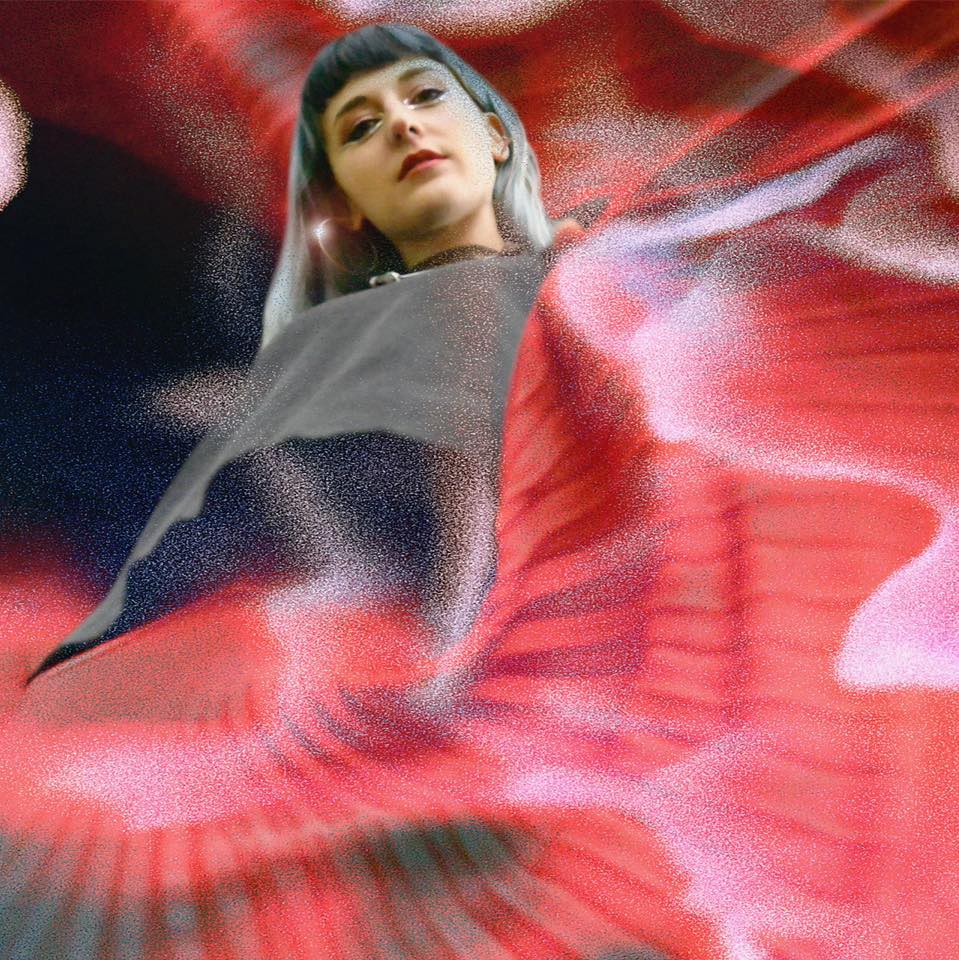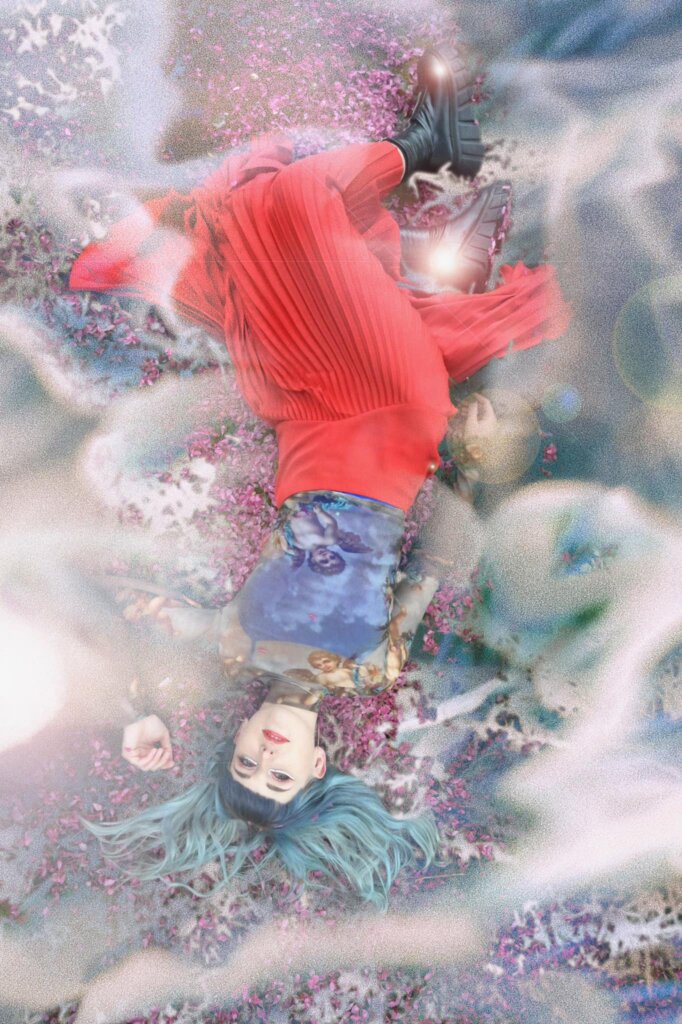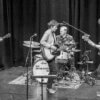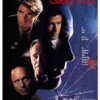Every now and then a musician comes along whose music loudly declares a unique voice which transports you elsewhere. Coco Varda is such an artist. Drag, sci fi and all sorts pepper the history of their work culminating in the release of their debut EP, ‘There Are Worse Things On The Internet’. It makes sense that Coco Varda’s political and societal considerations are fascinating, as John Clay finds out below.
“Drag, for example, performing and watching it, I have found greater issues in society tend to be brought to the forefront. So I do not feel it is a means of escapism to detour from activism. Drag is activism.’” – Coco Varda
When did you become aware and further politicised regarding male privilege in the music industry?
Coco Varda: Probably right from the start! Being interested in electronic music initially, all the spaces I encountered were predominantly male. I joined a synthesiser club and was completely outnumbered. It didn’t bother me too much, but it was definitely eye opening.
Drag shows and art galleries became my haven. Although I was then in the minority in the sense that I was using my music to collaborate with performers and artists, who didn’t operate in the same production realm as I did.
I found it difficult to learn and grow my music production skills. It was challenging to find people I could trust outside of the drag and art haven to collaborate with. They would often end up having other intentions I wasn’t interested in pursuing.
Going on to study did help! I met lots of people who I learned from and felt safe with when I did my masters. But as I continue to work in music it is still predominantly men in production and positions of power. You have to be very careful.
What activist groups have you come across that position women more prominently in the industry? Recommend some that our readers may want to investigate/join/support.
Coco Varda: There’s a group on Facebook called 2% Rising. It is led by an amazing mastering engineer called Katie Tavini. They put on events and share opportunities with other women, trans and non-binary people working in sound. They are amazing!
There’s also Omnii who are a collective based in London. They run workshops and create safe spaces for women, trans and non-binary people to learn about live engineering and studio practice.
I’ve seen a few university societies pop up in the last couple years as well to counteract male dominated spaces. Definitely a shift since I started producing!

Are you still connected to the drag scene in Norwich? How has it evolved over the years?
Coco Varda: All of the people I was specifically collaborating with were also on my art course and have since dispersed following graduation and lockdown. A lot of them are still performing though now and doing amazing things around the UK.
There is actually a documentary about the scene I was in that features a song I co-wrote and performed. It’s called A Queer City. You can find links to stream it on their insta page @aqueercity
I don’t visit Norwich all that often now, but I know that there is still an incredibly vibrant scene with lots of balls, pageants and events happening regularly, at much larger venues from what I’ve seen.
What do you gain from expressing yourself via fantasy personas? Has it impacted your music making?
Coco Varda: As a kid I was very into sci-fi and fantasy, I always loved the idea of other realms and loved making art about stories and mythical beasts. I would often play games and make up scenarios with my friends where we existed as different beings in other worlds. I think I never really stopped being interested in that. I just found new ways to investigate those ideas through my art, music and drag performance. I can experiment more freely with my gender in these spaces as well.
I do think that expressing myself through sci fi and fantasy has helped me visualise the spaces in which my music exists, like a sort of sonic realm. As sound is divined by space, being imaginative about where I see my music taking form has definitely inspired it.
I also recently started playing DND. I’m quite new to it, but it’s another exciting way to experiment with identity or role play, although more in a psychologic and strategic sense. I’m a beginner, but I love it.
It’s fair to say that global culture is far more accepting and concedes the benefit of play beyond the infant stage. Would you say there is a negative in what Alan Moore cites as an infantilised world? Can a person unknowingly lose themselves to an arrested development as a response to a perceived loss of agency? As institutions continually and speedily reveal the toxicity in their bureaucratic process, it’s arguable that our access to play offers us a place to not only renew ourselves in, but as an alternate state in which to sidestep potent and required communal gatherings that are directly linked to social activism.
Coco Varda: Interesting point. I definitely think that Alan Moore has some validity in what he says. I think fantasy and sci-fi can be used as an escape from the restraints of society, however, I do feel the mediums and communities in which I work in today actually encourage political discourse as opposed to distract from it.
Drag, for example, performing and watching it, I have found greater issues in society tend to be brought to the forefront. So I do not feel it is a means of escapism to detour from activism. Drag is activism.
The sci-fi and fantasy I am interested in tends to focus on ideology that is reflected in society. I guess looking at ideas in other contexts or realms can help reveal the truths behind conditioning, the experiences of our own world.
Personally, I am not interested in Marvel movies, as I see this as blatant American propaganda. Not a fan of this kind of art, it is not what influences me, and I think Alan Moore writes and creates around these circles, with a direct criticism to them, which I appreciate.

What societal issues have you directly addressed through your drag performances and what political issues have been explored in your music, if at all?
Coco Varda: While I was studying my masters I researched and wrote my dissertation on gender identity in music and gender in relation to music aliases. In one of my pieces, I created a more masculine drag persona, and made a piece about gun violence and police brutality relating these issues to the pressures of a patriarchal system and the fragility of masculinity.
Another piece investigated, sexuality, reproduction and sexual agency. Which seems more relevant now with issues like the choice of abortion being taken away from people in the US.
I’ve been interested in gender in relation to cybernetics as well. Mainly inspired by Donna Haraway’s A Cyborg Manifesto, which describes the social progression of technology, eventually turning us into cyborg beings, making concepts like gender and race so fluid we transcend past them. This theme is definitely still present in my work and furthers my interest in sci-fi in a lot of ways.
My most recent EP touches into a lot of areas surrounding consciousness and being, but I wouldn’t say it’s politically driven.
What other artists would you recommend that are also contributors to the Atlantic Waves radio show?
Coco Varda: We are a small group at the moment, but open to getting more people involved to do a guest set or to share music and ideas with. So if anyone reading this is interested send us a message on the Atlantic Waves insta.
So far we have PhaseLESS, Alfred Isaac, Matt Cain, Harry Harrison and I for the hosts.
A couple notable, and very talented artists to mention who don’t host, but we have good relationships with are tAngerinecAt and VASCHA. Definitely check their music out. Very powerful work.
We can certainly vouch for tAngerinecAt and am rather pleased that they put us in touch. Thanks again for such a cool interview. If only there was more time for further questions.
Coco Varda: Me too! Thank you for your interest in my work and your thought provoking questions. Really appreciate your time.
Live video for ‘Airplane Mode’ is out now:
Follow Coco Varda on:
Facebook – https://www.facebook.com/CocoVarda
Instagram – https://www.instagram.com/coco_varda/
Follow John Clay on:
https://heylink.me/Johnclayartist/
All pics by https://www.instagram.com/moralxdecay/
Follow Coco Varda on:
Facebook – https://www.facebook.com/CocoVarda
Instagram – https://www.instagram.com/coco_varda/
https://www.instagram.com/johnclayclarkkent/
All pics by https://www.instagram.com/moralxdecay/



